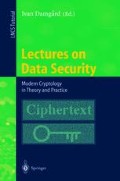Abstract
In the first part of this discussion, we first briefly discuss various prime generation methods, starting with the Rabin-Miller test, and then moving on to a very simple new deterministic test. After that we discuss various ways of constructing so-called strong primes, and why this better be avoided.
Access this chapter
Tax calculation will be finalised at checkout
Purchases are for personal use only
Preview
Unable to display preview. Download preview PDF.
References
G.L. Miller, Riemann’s hypothesis and test for primality, Journal of Computer and System Sciences 13 (1976), 300–317.
M.O. Rabin, Probabilistic algorithm for testing primality, Journal of Number Theory 12 (1980), 128–138.
P. Comba, Exponentiation Cryptosystems on the IBM PC, IBM Systems Journal, vol. 29, 4, 1990.
I. Damgaard and P. Landrock: Improved bounds for the Rabin Primality Test, Proceedings of the IMA Conference on Cryptography and Coding III, 1991, Oxford University Press, ed. by M.J. Ganley.
I. Damgaard, P. Landrock and C. Pomerance: Average Case Error estimates for the Strong Probable Prime Test, Math. Computations 61 (1993), 177–194.
S.-H. Kim and C. Pomerance, The probability that a random probable prime is a composite, Math. Computations 86 (1986), 259–279.
P. Beauchemin, G. Brassard, C. Crépeau, C. Goutier and C. Pomerance, (1988), The Generation of random Numbers that are Probably Prime, J. Cryptology vol. 1 (1988), 53–64.
G.H. Hardy and E.M. Wright, An Introduction to the Theory Numbers, Oxford University Press, fifth ed. (1978).
U. Maurer, Fast generation of secure RSA-moduli with almost maximal diversity, Advances in Cryptology-EUROCRYPT’89, LNCS 547 (1991), 458–471.
J. Brandt, I. Damgaard and P. Landrock, Speeding up Prime Number Generation, Proc. of Asiacrypt’91, Springer LNCS, vol. 739.
J. Gordon, Strong RSA keys, Electronic Letters 20 (June 7, 1984), 514–516.
Mike Ganley Electronic Letters 1990
Author information
Authors and Affiliations
Editor information
Editors and Affiliations
Rights and permissions
Copyright information
© 1999 Springer-Verlag Berlin Heidelberg
About this chapter
Cite this chapter
Landrock, P. (1999). Primality Tests and Use of Primes in Public Key Systems. In: Damgård, I.B. (eds) Lectures on Data Security. EEF School 1998. Lecture Notes in Computer Science, vol 1561. Springer, Berlin, Heidelberg. https://doi.org/10.1007/3-540-48969-X_6
Download citation
DOI: https://doi.org/10.1007/3-540-48969-X_6
Published:
Publisher Name: Springer, Berlin, Heidelberg
Print ISBN: 978-3-540-65757-6
Online ISBN: 978-3-540-48969-6
eBook Packages: Springer Book Archive

